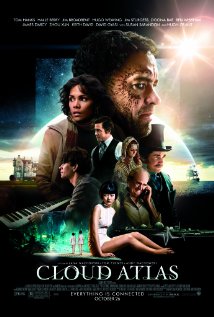Review: Cloud Atlas
 Last year critics hailed Hugo as a "love letter to film." This year, you could say Cloud Atlas is a love letter to love and human relationships. Filmmakers Andy and Lana Wachowski and Tom Tykwer have adapted a book it was thought would be impossible to bring to the screen, and in so doing crafted a masterpiece many are calling the year's finest film.
Last year critics hailed Hugo as a "love letter to film." This year, you could say Cloud Atlas is a love letter to love and human relationships. Filmmakers Andy and Lana Wachowski and Tom Tykwer have adapted a book it was thought would be impossible to bring to the screen, and in so doing crafted a masterpiece many are calling the year's finest film.
Spanning centuries, six stories are woven together as souls reborn into new lives play out adventures, love stories and tales of treachery. Each tale is linked to the next by a message in the form of a diary, love letters ... even a screenplay. Together, thanks to a monumental work of editing, the synchrony between each story becomes apparent, and the whole truly is greater than the sum of its parts.
A mentor tells me that a film critic should only write about what's on the screen, but that pre-supposes a film can be left behind when you leave the theater. It makes no allowance for the effect a movie has on the audience and thus eliminates half of the equation. Film is an art form and thus a communication between the filmmakers and the audience. Therefore, knowing the background of the filmmakers, the context of this communication, can help the audience better understand this message.
There is no shortage of Lana Wachowski's personal struggle visible in Cloud Atlas, where the actors are chameleons playing characters of different ages, races and sexes from one scene to the next. This is done with such effectiveness that not only is it difficult for the audience to recognize actors, they reportedly did not always recognize each other on set. Tom Hanks is always recognizable, as is Hugo Weaving, but Halle Berry, Jim Broadbent, Jim Sturgess, Doona Bae, Ben Whishaw, James D'Arcy, Keith David, Hugh Grant and even Susan Sarandon turn up in surprisingly unexpected places.
Tykwer has created a moving score that accentuates emotional highlights and winds through each scene, connecting an 18th century merchant ship to a 23rd century revolution and making their connection believable. It's already available for download on iTunes and worth a listen. It's as listenable a film score as the Daft Punk soundtrack from 2010's Tron: Legacy, and probably the best since then.
Just as the score bears repeat listens, Cloud Atlas is worthy of continued repeat viewings. The six tales within are so richly furnished with alliterative ideas there is more to discover each time. Repeated themes of love, responsibility and human connection make for a soul-cleansing experience.

